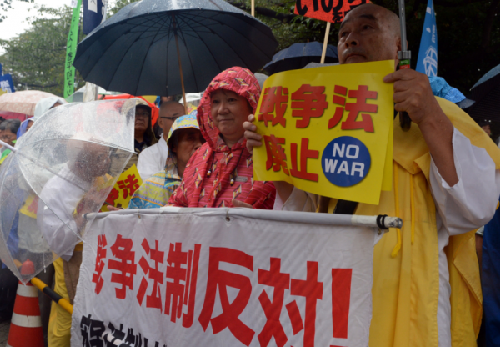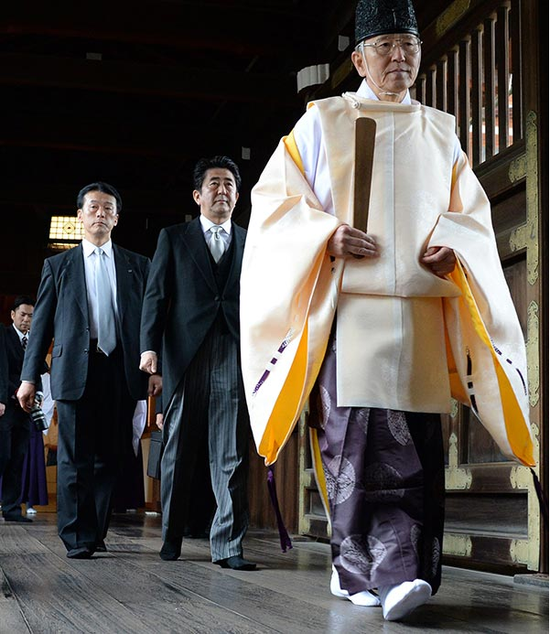Japanese media forced reporters to criticize China: not critical manuscript without Japanese | | | Japan bought a British think-tank China threat theory _ news
The Sunday Times of London published, Embassy of Japan in the UK started about a year ago, £ 10,000 a month bought British right-wing think-tanks made in England and rendering of "China threat". Analysts pointed out that Japan's Government for overseas Chinese poured "the water of public opinion" the tip of the iceberg.
Reference News reported on February 7, many Japan reporters privately lamented "is not in the manuscript added comments criticizing China, the manuscript will not pass" and that this "is not a command from your boss, but journalists self-censoring", "China threat in Japan has been the norm in the room."
Japan home, Abe Government process and incite "China threat theory" is even more blatant. Through both at home and abroad at the same time rendering of "China threat", especially the "military threat", surrounded by external seeks to build on China NET, domestic and promoting the adoption of new security policies, even constitutional, it is the Japanese Government's "wishful thinking".

> On September 19, 2016, tens of thousands of people held a protest rally in Tokyo, Japan, called for the abolition of the new security law.
The "China threat" on the lips
Processing and incitement "China threat theory" can be said to have the Japanese Government's trick and engulfed the Japanese media of the "air".
In view of Japan's recent defense white paper of China-related chapters, will find its use year after year, "China's increased defense expenditure continued high levels" and "widely and rapidly strengthening nuclear and missile capabilities as well as Navy and air force as the center of military power", "military and security aspects such as lack of transparency" and other words. "In the East China Sea and South China Sea such as rapid expansion of activity" "on marine issues with strength in the background trying to change the status quo ... ... High pressure "trend of more upgrades. Moreover, the white paper on China "activities in neighboring airspace", "activity in the South China Sea and the Indian Ocean" list and analysis of micro strip chart, best to play up the "China threat."
Defense Research Institute official Fang Zhiku on China studies often renders the content, such as China's naval militia had military backgrounds, may have "incited to induce" tasks, so that "China's justification of military action"; China and Russia's joint maritime exercise, rendering the level of military cooperation between China and Russia and increased.
Abe and his Cabinet in Parliament in reply to "China's rapidly advancing military expansion" and "China surrounding security situation is grim" on the lips.
Media into Government mouthpieces
Japanese Government and officials the terms of high frequency appears in the mainstream Japanese media. Kyodo News Agency visiting dissertation Committee said Okada full, many Japan reporters privately lamented "is not in the manuscript added comments criticizing China, the manuscript will not pass" and that this "is not a command from your boss, but journalists self-censoring", "China threat in Japan has been the norm in the room." In this case, any trends of China in areas such as security and even space are malicious or exaggerated interpretation. Last October, China successfully launched the "Shenzhou 11th" and "temple on the second", the Sankei Shimbun immediately to the Chinese military uses under the title of the world reported that other Japanese television and newspapers have a similar argument. Even previously considered relatively neutral and some media are also caught in this loop. For example carrier Liaoning, China on December 25 last year by Miyako on the waterway was a Japanese media "strategy" has dramatically rendered reported that Asahi Shimbun commented that "China's defense ability ... ... (Aim) shake the Trump ... ... To contain Taiwan. "
Japan media for government security policy and the critical spirit of foreign policy is also gradually loses. Okada filling points out that: "the media has the power to set issues, but now in some ways but gave up that power to create, in the Government's stand on the debate. "" The Government view is not fully verified, a parrot (spread), allowing space becoming a mouthpiece of the Government, and not much worse before the war. "He said, in the Islands and on the issue of China's military, which especially accelerated. "The Abe Government, this is the opportunity for momentum to achieve the constitutional".
Ministry bought United Kingdom think tank spread about the China threat, Japan media not reported, only some of the users mentioned on forums, media chose to shield it.

> In December 2013, Abe visited the Yasukuni Shrine
For the militarization of sympathy
The Japanese Government and media processing and playing up the China threat theory behind, is Japan's new security laws, release of collective self-defense, military spending in five continuous increases in the context of the fiscal deficit, and constitutional forces in the wings. It can be said that rendered the China threat is the policy of the Government of Japan, through, and an otherwise unpopular policies towards the sympathy of a magic weapon.
Who had worked in Japan a major media, freelance reporters, prior to the consideration of new security law, Ministry of Foreign Affairs for China in the East China Sea "establish 12 new mining platform" and published aerial photographs. "It was a Foreign Ministry official who requested anonymity told reporters clearly that, ' this is the residence of the assignment. ”
Before the new security law review, in order to promote public understanding of the Security Bill, Abe himself on Japanese television programs or Internet video platform shows the explanation, but the explanation, the bills more prominent the contradiction, in that case, the Japanese Government has turned to publicizing China's threat, incited crisis.
China expert, Cun, Tian Zhongxi, Emeritus Professor, Yokohama National University pointed out that, in 2015, the Senate Special Committee during its consideration of new security legislation, Abe quoted 2015 defence white paper a practical algorithm for playing the catch data-"27 years (1988 to 2014) China's defense spending increased from 41 times times"-to render the Chinese threat. Original, 2015 version defense white paper to exaggerated China threat, selected has Stockholm International Peace Institute (SIPRI, announced States military database of authority institutions) of China defense fee starting data (1989 data) Qian one years of data to do compared, and will place transfer spending also is to has defense fee in, this makes according to SIPRI data from 1989 to 2014 about increased to 30 times times of China military jumped rose to "1988 to 2014 increased to 41 times times".
In fact, according to the SIPRI data, China's military growth and the growth of China's gross domestic product over the same period while per capita, 2014, the per capita cost of $360, only US $155, less than half the Japanese. The so-called "military expansion" is not as "China threat" basis.
But advocated the China threat, especially military threats, inciting national sense of making excuses, Abe's Government has slipped "exclusively defense," bound, lifted the collective self-defence, revised the "three principles on arms exports", and a further step towards a Constitution.
July 2016 Senate elections, constitutional forces had two-thirds seats. Ban polls against collective self-defense and over half of the voters of the new security, but why were the results? Unwilling to revealed name of Japan a University politics Professor pointed out that, opposition not device, and small election district system such of technical factors is is reasons, but Ann times Government advocates of "China threat on the" get has quite of penetration, and opposition no in security legal of considered in the on "China threat on the" of real situation for full of question, is appeared above results of deep reasons.
With each table is the "globe" diplomacy, the United States follow, bargains in Islands dispute with China national money, seek to build around, "surrounded by nets to China."
Cun, Tian Zhongxi said: "as a neighbouring country, Japan would be the tremendous impact of China's development and changes, should not simply be a ' threat ' to get carried away, but seeing the trend of the times, according to the facts, make clinical judgments. "(Reporter Yang Ting)
> Editor: Ni Zi Jiang
Article keywords:Japan China threat Japan bought United Kingdom think tank
I want feedback
Save a Web page
Xinhua
日本媒体强迫记者批判中国:不批判稿子就不通过|日本|中国威胁论|日本收买英国智库_新闻资讯
英国《星期日泰晤士报》近日披露,日本驻英国大使馆从大约一年前开始,每月出资1万英镑收买英国一家右翼智库在英国制造和渲染“中国威胁论”。分析人士指出,这只是日本政府在海外对中国泼“舆论脏水”的冰山一角。
参考消息2月7日报道,很多日本记者私下感叹“不在稿子里加入批判中国的评论,稿子就通不过”,并且这“不是来自上司的命令,而是记者的自我审查”,“中国威胁论在日本的言论空间中已经常态化”。
在日本国内,安倍政府炮制和煽动“中国威胁论”更是明目张胆。通过在国内外同时渲染“中国威胁”,尤其是“军事威胁”,对外谋求构建对华包围网,对内推动通过新的安保政策,甚至修宪,正是日本政府的“如意算盘”。

> 2016年9月19日,数万日本民众在东京举行抗议集会,呼吁废除新安保法。
“中国威胁”挂在嘴边
炮制和煽动“中国威胁论”可以说说已成为日本政府的惯用伎俩和笼罩日本媒体的“空气”。
查看日本近年的《防卫白皮书》中与中国相关的章节,会发现其年复一年地使用“中国持续高水平地增加国防费”“广泛和急速地强化核和导弹战力以及以海空军为中 心的军事力量”“军事和安保等方面透明性不足”等措辞。“在东海和南海等空域急速扩大活动”“在海洋问题上以实力为背景尝试改变现状……采取高压应对”等 表述更有升级趋势。不仅如此,白皮书还对中国“在周边空域的活动”“在南海以及印度洋的活动”等事无巨细地带图表进行罗列和分析,极力渲染“中国威胁”。
防卫研究所等官方智库的涉华研究报告也经常有渲染内容,如指中国的海上民兵组织有军方背景,可能承担“挑唆诱使”的任务,从而使“中国的军事行动正当化”;分析中国和俄罗斯海上联合演习,渲染中国和俄罗斯军事合作层次不断提高等。
安倍及其内阁成员在国会答辩中也将“中国急速推进军扩”“中国的周边安全形势严峻”等挂在嘴边。
媒体成政府传声筒
日本政府和官方的上述措辞高频出现在日本主流媒体上。共同社客座论说委员冈田充说,很多日本记者私下感叹“不在稿子里加入批判中国的评论,稿子就通不过”, 并且这“不是来自上司的命令,而是记者的自我审查”,“中国威胁论在日本的言论空间中已经常态化”。在这种情况下,中国在安保甚至航天等领域的任何动向都 被恶意或夸大地进行解读。如去年10月中国成功发射“神舟十一号”和“天宫二号”,《产经新闻》立即以《世界警惕中国军事利用加剧》为题进行报道,其他日 本电视台和报纸也持类似论调。即使是以前被认为较为客观中立的一些媒体也陷入这一怪圈。比如去年12月25日中国航母辽宁舰通过宫古水道一事就被日媒扯上 “战略”进行了大幅渲染报道,《朝日新闻》也评论说“中国防卫能力增强……(此举旨在)撼动特朗普……牵制台湾”。
日本媒体对于政府安保政 策和外交政策的批判精神也在渐渐丧失。冈田充指出:“媒体原本有设定议题的权力,但现在在某些方面却放弃了议题设定权,在政府设定的台子上进行议论。” “不对政府发布的观点进行充分验证,就像鹦鹉学舌一样(传播出去),使得言论空间渐渐成为政府的传声筒,与战前差不了多少。”他表示,在岛屿问题和中国军 事问题上,这种倾向尤其在加速。“对于安倍政府来说,这是一鼓作气实现修宪的良机”。
关于外务省收买英国智库散布中国威胁论一事,日本媒体完全没有报道,仅在某些论坛上有网友提及,可见日媒选择了屏蔽此事。

>2013年12月,安倍晋三参拜靖国神社
为军事化博取同情
日本政府和媒体炮制和渲染中国威胁论的背后,是日本通过新安保法,解禁集体自卫权,军费在财政大幅赤字的背景下五连增,以及修宪势力蠢蠢欲动。可以说,渲染中国威胁论是日本政府推动政策通过,并为原本不得民心的政策争取同情的一大法宝。
一位曾供职于日本某主要媒体的自由撰稿人对记者说,新安保法审议之前,外务省披露中国在东海“新设12座开采平台”并公布航拍照片。“当时一位要求匿名的外务省官员明确对记者说,‘这是官邸布置的作业’。”
在新安保法审议之前,为了推动日本民众对安保法案的理解,安倍晋三亲自上日本电视台节目甚至互联网视频平台节目进行解释,但越解释,法案的矛盾就越突出,这种情况下,日本政府就转而宣传中国威胁,煽动危机感。
中国问题专家、横滨国立大学名誉教授村田忠禧指出,在2015年参议院特别委员会审议新安保法案期间,安倍引用了2015年版防卫白皮书的一个实际在算法上 玩了猫腻的数据——“27年间(1988年到2014年)中国防卫费增至41倍”——来渲染中国威胁。原来,2015年版防卫白皮书为了夸大中国威胁,选 取了斯德哥尔摩国际和平研究所(SIPRI,公布各国军费数据库的权威机构)的中国国防费起始数据(1989年数据)前一年的数据来做比较,并且将地方转 移支出也算到了防卫费里,这使得根据SIPRI数据从1989年到2014年约增至30倍的中国军费跳升至“1988年到2014年增至41倍”。
事实上,根据SIPRI的数据,中国军费的增长并不及同期中国国内生产总值的增长,同时按照人均来看,2014年日本的人均费用为360美元,中国只有155美元,不到日本一半。所谓“军费膨胀”等根本不能作为“中国威胁”的依据。
然而通过鼓吹中国威胁,尤其是军事威胁,煽动国民的危机感,制造借口,安倍政府已经挣脱了“专属防卫”的束缚,解禁了集体自卫权,修改了“武器出口三原则”,并进一步迈向修宪。
2016 年7月的参议院选举,修宪势力得到了三分之二的议席。民调显示反对解禁集体自卫权和新安保法的选民过半,但为何会出现上述结果?不愿透露姓名的日本某大学 政治学教授指出,在野党不成器,以及小选举区制度这样的技术性因素固然也是原因,但安倍政府鼓吹的“中国威胁论”得到了相当的渗透,以及在野党没有在安保 法制的审议中就“中国威胁论”的真实情况进行充分的质询,是出现上述结果的深层原因。
与之互为表里的是安倍的“地球仪外交”,对美国更加亦步亦趋,在与中国存在岛屿争议的国家大肆撒钱,四处谋求构建“对华包围网”。
村田忠禧认为:“作为邻国,日本会受到中国的发展和变化的巨大影响,不应简单地被‘威胁论’冲昏头脑,而应看清时代潮流,根据事实,做出冷静客观的判断。”(记者杨汀)
>责任编辑:倪子牮
文章关键词: 日本 中国威胁论 日本收买英国智库
我要反馈
保存网页
新华网